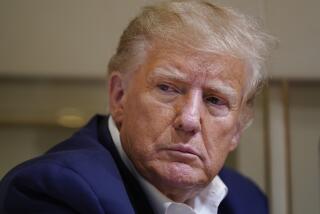CIA Says Iraq’s Kuwait Document Won’t Wash : Intrigue: It describes a meeting that never took place, U.S. says. Baghdad cited the paper as proof of a conspiracy.
- Share via
WASHINGTON — The CIA said Wednesday that a document Iraqi Ambassador Mohammed Mashat cited as proof that the United States and Kuwait conspired against Iraq last year describes a meeting that never took place.
CIA spokesman Mark Mansfield said the memo, purportedly captured from Kuwait’s intelligence files, is a “total fabrication.”
Mashat distributed Arabic and English copies of what he said was a memo from Brig. Fahd Ahmad Fahd, the director general of state security in Kuwait’s now-deposed government, to his boss, Interior Minister Salim al Sabah al Sabah. The memo, which described a Nov. 14, 1989, meeting between Fahd and CIA Director William H. Webster, was given to the United Nations on Tuesday. Mashat contended that the memo is proof of “an economic conspiracy aimed at destroying our economy.”
“We agreed with the American side that it was important to take advantage of the deteriorating economic situation in Iraq in order to put pressure on that country’s government to delineate our common border,” the memo said. “The Central Intelligence Agency gave us its view of appropriate means of pressure, saying that broad cooperation should be initiated between us, on condition that such activities are coordinated at a high level.”
If genuine, the memo seems to indicate that Washington had advised Kuwait to capitalize on Iraq’s economic problems to gain an advantage in border disputes going back to Kuwaiti independence in 1961. This would show that the United States was siding with Kuwait in the long-festering dispute, in which Washington was officially neutral.
Such a preference for Kuwait’s claims would not have been particularly surprising, since the United States enjoyed friendly relations with Kuwait at the time, while its relationship with Iraq was distant and cool. The potentially rich Rumaila oil field straddles the border.
However, Mansfield said that Fahd did not meet Webster at all last November. He said that Fahd’s deputy “did pay a routine courtesy call on Judge Webster in November, 1989. There was nothing discussed at that meeting concerning Kuwait’s relations with Iraq or any other countries.”
The memo is not an obvious forgery, particularly since if Iraqi officials had written it themselves, they almost certainly would have made it far more damaging to U.S. and Kuwaiti credibility.
It seems to place the United States on Kuwait’s side of the dispute that preceded the Iraqi invasion. April Glaspie, U.S. ambassador to Baghdad, had assured Iraqi President Saddam Hussein of U.S. neutrality shortly before Iraqi troops moved Aug. 2.
When a reporter asked Mashat to assess why the memo seemed to run directly opposite to the thrust of Glaspie’s meeting with Hussein, the ambassador said that the Glaspie meeting “is part and parcel of the setup.” Critics of the State Department have charged that Glaspie’s message, delivered on the instructions of her superiors, gave a “green light” to the Iraqi aggression.
In 1922, when both Iraq and Kuwait were essentially under British control, a border was drawn between the two states. After Kuwait obtained its independence in 1961, Iraq claimed all of Kuwait. The Arab League, which mediated the dispute, established a military demarcation line at the 1922 border, but it was never ratified by either country.
According to Henry M. Schuler, an energy security expert at the Center for Strategic and International Studies in Washington, the Arab League-imposed settlement required both Iraq and Kuwait to refrain from establishing permanent facilities in a buffer zone on either side of the line.
“In 1981, when Iraq became preoccupied with its war against Iran, the Kuwaitis moved drilling rigs up to the border and drilled a few wells into the Rumaila oil field,” Schuler said. “I understand they have never produced more than 10,000 barrels a day from Rumaila, a small fraction of Kuwait’s OPEC (Organization of Petroleum Exporting Countries) quota of 1.1 million barrels a day. What they were doing was establishing facts on the ground.”
Schuler said that Kuwait’s actions in 1981 were intended to strengthen its hand in the border dispute, taking advantage of Iraq’s military difficulties. The Fahd memo seems to suggest similar steps in 1989 resulting from Iraqi economic problems.
More to Read
Sign up for Essential California
The most important California stories and recommendations in your inbox every morning.
You may occasionally receive promotional content from the Los Angeles Times.













